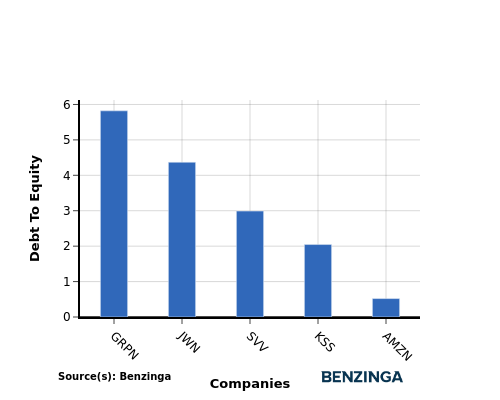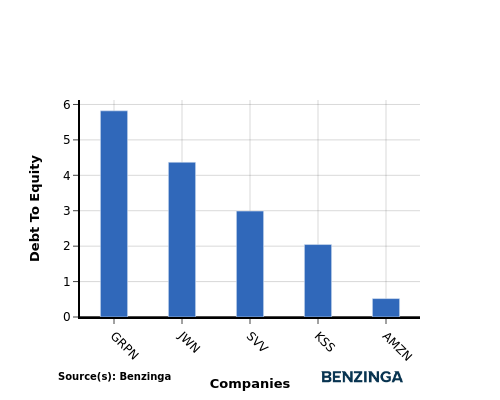In today's rapidly evolving and fiercely competitive business landscape, it is crucial for investors and industry analysts to conduct comprehensive company evaluations. In this article, we will undertake an in-depth industry comparison, assessing Amazon.com AMZN alongside its primary competitors in the Broadline Retail industry. By meticulously examining crucial financial indicators, market positioning, and growth potential, we aim to provide valuable insights to investors and shed light on company's performance within the industry.
Amazon.com Background
Amazon is the leading online retailer and marketplace for third party sellers. Retail related revenue represents approximately 75% of total, followed by Amazon Web Services' cloud computing, storage, database, and other offerings (15%), advertising services (5% to 10%), and other the remainder. International segments constitute 25% to 30% of Amazon's non-AWS sales, led by Germany, the United Kingdom, and Japan.
| Company | P/E | P/B | P/S | ROE | EBITDA (in billions) | Gross Profit (in billions) | Revenue Growth |
|---|---|---|---|---|---|---|---|
| Amazon.com Inc | 48.09 | 9.13 | 3.88 | 6.19% | $32.08 | $31.0 | 11.04% |
| Alibaba Group Holding Ltd | 18.53 | 1.63 | 1.68 | 4.64% | $54.02 | $92.47 | 5.21% |
| PDD Holdings Inc | 10.32 | 3.78 | 3 | 9.38% | $29.18 | $59.65 | 44.33% |
| MercadoLibre Inc | 66.66 | 23.81 | 5.21 | 10.37% | $0.72 | $2.44 | 35.27% |
| JD.com Inc | 12.76 | 1.82 | 0.40 | 5.22% | $15.92 | $45.04 | 5.12% |
| Coupang Inc | 41.70 | 10.19 | 1.48 | 1.74% | $0.28 | $2.27 | 27.2% |
| eBay Inc | 15.93 | 5.59 | 3.14 | 11.59% | $0.95 | $1.85 | 3.04% |
| Vipshop Holdings Ltd | 6.87 | 1.42 | 0.52 | 2.76% | $1.47 | $4.96 | -9.18% |
| Dillard's Inc | 12 | 3.77 | 1.13 | 6.37% | $0.21 | $0.63 | -3.53% |
| MINISO Group Holding Ltd | 23.54 | 5.56 | 3.84 | 6.68% | $0.88 | $2.03 | 19.29% |
| Ollie's Bargain Outlet Holdings Inc | 33.04 | 4.21 | 3.04 | 3.14% | $0.08 | $0.22 | 12.41% |
| Macy's Inc | 25.72 | 1.08 | 0.20 | 3.53% | $0.44 | $2.16 | -3.48% |
| Nordstrom Inc | 14.53 | 3.84 | 0.26 | 4.75% | $0.29 | $1.31 | 4.34% |
| Kohl's Corp | 6.86 | 0.45 | 0.10 | 0.58% | $0.28 | $1.57 | -8.49% |
| Savers Value Village Inc | 22.15 | 3.76 | 1.12 | 5.09% | $0.07 | $0.22 | 0.53% |
| Groupon Inc | 18.07 | 12.40 | 0.93 | 34.72% | $0.03 | $0.1 | -9.48% |
| Average | 21.91 | 5.55 | 1.74 | 7.37% | $6.99 | $14.46 | 8.17% |
By closely examining Amazon.com, we can identify the following trends:
-
Notably, the current Price to Earnings ratio for this stock, 48.09, is 2.19x above the industry norm, reflecting a higher valuation relative to the industry.
-
The elevated Price to Book ratio of 9.13 relative to the industry average by 1.65x suggests company might be overvalued based on its book value.
-
The Price to Sales ratio of 3.88, which is 2.23x the industry average, suggests the stock could potentially be overvalued in relation to its sales performance compared to its peers.
-
The Return on Equity (ROE) of 6.19% is 1.18% below the industry average, suggesting potential inefficiency in utilizing equity to generate profits.
-
With higher Earnings Before Interest, Taxes, Depreciation, and Amortization (EBITDA) of $32.08 Billion, which is 4.59x above the industry average, the company demonstrates stronger profitability and robust cash flow generation.
-
With higher gross profit of $31.0 Billion, which indicates 2.14x above the industry average, the company demonstrates stronger profitability and higher earnings from its core operations.
-
The company's revenue growth of 11.04% is notably higher compared to the industry average of 8.17%, showcasing exceptional sales performance and strong demand for its products or services.
Debt To Equity Ratio

The debt-to-equity (D/E) ratio is an important measure to assess the financial structure and risk profile of a company.
Considering the debt-to-equity ratio in industry comparisons allows for a concise evaluation of a company's financial health and risk profile, aiding in informed decision-making.
In terms of the Debt-to-Equity ratio, Amazon.com can be assessed by comparing it to its top 4 peers, resulting in the following observations:
-
Amazon.com exhibits a stronger financial position compared to its top 4 peers in the sector, as indicated by its lower debt-to-equity ratio of 0.52.
-
This suggests that the company has a more favorable balance between debt and equity, which can be seen as a positive aspect for investors.
Key Takeaways
For Amazon.com, the PE, PB, and PS ratios are all high compared to its peers in the Broadline Retail industry, indicating that the stock may be overvalued. The low ROE suggests that Amazon.com is not generating significant returns on shareholder equity. However, the high EBITDA, gross profit, and revenue growth show that the company is performing well in terms of operational efficiency and revenue generation compared to its industry peers.
This article was generated by Benzinga's automated content engine and reviewed by an editor.
© 2024 Benzinga.com. Benzinga does not provide investment advice. All rights reserved.








